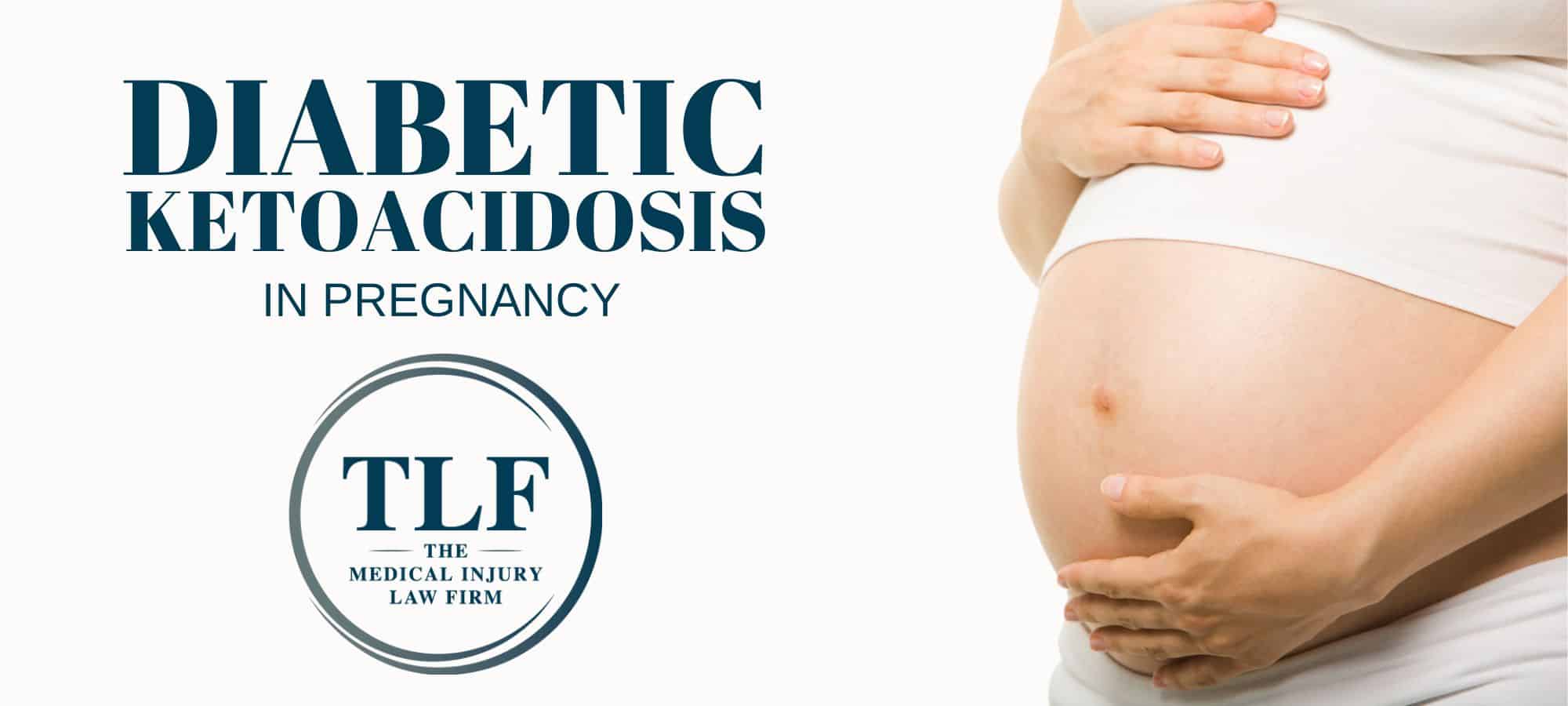Putting Our Knowledge And Experience To Work
Home » Birth Injuries » Diabetic Ketoacidosis in Pregnancy
Diabetic Ketoacidosis in Pregnancy
Malpractice Attorneys for Undiagnosed or Mismanaged Diabetic Ketoacidosis During Pregnancy
If you or your child were injured due to a mismanagement of diabetic ketoacidosis during pregnancy, you may be entitled to compensation for your pain and suffering, medical expenses, and other associated damages.
At TLF: The Medical Injury Law Firm, we are experienced in helping birth injury victims and their families recover the compensation they deserve for medical negligence. To speak with one of our diabetic ketoacidosis malpractice attorneys, please call us at (800) 698-4054 or reach out to us online today.

What is Diabetic Ketoacidosis?
Diabetic ketoacidosis, or DKA, is a complication of diabetes resulting from a lack of insulin and leading to abnormally high levels of acids in the blood. The purpose of insulin in the human body is to help blood glucose (sugar) convert to energy. In patients with diabetes, blood sugar levels cannot be properly regulated because of the lack of insulin.
DKA is most common in patients diagnosed with type 1 diabetes. However, patients diagnosed with type 2 diabetes are not immune to diabetic ketoacidosis, and their risk increases with catabolic stressors such as infection, trauma, surgical procedures, or those who are prone to ketosis.
The condition also produces an excess of counterregulatory hormones, including glucagon, catecholamines, glucocorticoids, and growth hormone. The relative insulin deficiency paired with the increased hormone concentrations results in ketosis and hyperglycemia.
How Common is Diabetic Ketoacidosis in Pregnancy?
According to the National Library of Medicine, diabetic ketoacidosis-related hospitalizations are continuously increasing in the United States. In the decade between 1996 and 2006 alone, the number of cases increased by 35%, bringing the total number of cases in 2006 to 136,510. These rates have continued to increase over the past 16 years, especially in the height of the COVID-19 pandemic.
In pregnant diabetic women specifically, DKA appears in approximately 0.5 to 3 percent of patients. As previously mentioned, diabetic ketoacidosis can be more common in those who are ketosis prone. Because of the metabolic changes as well as the general increased insulin resistance common in late gestation, pregnant women are especially prone to ketosis, meaning they may also be prone to lower blood glucose levels and DKA.

What Causes Maternal Diabetic Ketoacidosis?
During gestation, especially during the second and third trimesters, the fetus and placenta absorb significant amounts of maternal glucose, inevitably leading to decreased maternal fasting glucose. This relative insulin deficiency leads to an increase of free fatty acids, eventually transforming into ketones in the liver.
The typical precipitating factors of diabetic ketoacidosis include the following:
- Undiagnosed pregnancy
- Vomiting
- Dehydration
- Intercurrent illnesses
- Infections (i.e. urinary tract infections)
- Failure to follow prescribed treatment plan
- Administration of steroids for fetal lung maturation (“Betamimetic tocolytic therapy for patients with preterm labor and antenatal corticosteroids administered to accelerate fetal lung maturity can cause counterregulatory hormone excesses leading to DKA,” Camille E. Powe, MD.)
- Trauma
- Cardiac ischemia
- Improper insulin management
- Insulin pump failure
Signs of Diabetic Ketoacidosis in Pregnant Women
Diabetic ketoacidosis generally presents itself similarly in a pregnant woman as it would a nonpregnant individual. However, in a diabetic pregnant women (either having pregestational diabetes mellitus or gestational diabetes mellitus), DKA tends to progress much faster and can be identified at lower serum glucose levels.
Signs and symptoms of diabetic ketoacidosis in pregnancy can also be harder to recognize in pregnant women, as many of the symptoms might easily be chalked up to simply being pregnant. Symptoms of diabetic ketoacidosis typically include:
- Nausea and vomiting
- Abdominal pain
- Increased renal excretion (excessive urine output)
- Abnormal thirst
- Headaches
- Fatigue
- Rapid breathing
- Muscle aches
- Change in mental status
Meanwhile, laboratory findings may include:
- Lower blood glucose levels
- Renal dysfunction
- Electrolyte imbalance
- Acidemia
- Hyperglycemia
- Elevated anion gap
- Ketonemia

Risks of Diabetic Ketoacidosis in Pregnancy
Diabetic ketoacidosis in pregnant women signals an obstetric emergency because when not properly managed, maternal and fetal outcomes can be grim. Without early detection and proper management, it can result in life-threatening and even fatal injuries to both mother and baby.
In pregnancies complicated with diabetic ketoacidosis, there may be an increased risk of:
- Hypoxemia
- Maternal metabolic acidosis
- Fetal acidosis
- Fetal distress
- Cerebral edema
- Acute renal failure
- Maternal and perinatal morbidity
- Maternal and fetal mortality
How To Treat Diabetic Ketoacidosis in Pregnancy
Diabetic ketoacidosis typically progresses much faster in pregnant women than it does nonpregnant patients. This makes it all the more crucial that physicians and other medical providers diagnose DKA in early pregnancy so they can get ahead of the treatment and ensure proper maternal and fetal monitoring.
Treating pregnant patients with DKA requires a multidisciplinary approach. This includes an obstetrician/gynecologist, an obstetric anesthesiologist, and an endocrinologist familiar with the physiologic changes that come with pregnancy. It also requires skilled nursing professionals to provide around-the-clock care.
In order to properly manage a pregnancy complicated by DKA and reduce the risk of unfavorable perinatal outcomes, medical professionals should focus on the following principles:
- Intravenous insulin therapy
- Volume replacement
- Electrolyte management
- Acidosis correction
- Blood pressure management
- Maternal and fetal monitoring in response to treatment
When it comes to delivery options, the decision should be based on both the mother and baby’s responses to treatment as well as fetal gestational age. Before proceeding with delivery, however, it is critical that the maternal metabolic abnormalities are corrected first.

Can I Sue for Undiagnosed or Mismanaged Diabetic Ketoacidosis?
Diabetic ketoacidosis should be suspected in diabetic pregnancies and those who show symptoms. This is especially true if any precipitating factors are involved. Prompt hospitalization, intensive monitoring, and targeted therapy and treatment is necessary for those who have maternal diabetic ketoacidosis. Failure to detect and properly manage the condition early on can lead to extremely adverse outcomes, including both maternal mortality and fetal loss.
If a medical professional fails to diagnose, delays a diagnosis, or misdiagnoses a pregnancy complicated with DKA and it leads to serious birth injuries or even wrongful death of either the mother or child, there may be grounds for a medical malpractice lawsuit. Even if the diagnosis was accurately made, but a physician or other medical professional failed to uphold the necessary standard of care in treating and regulating the condition, victims and/or their families have legal options available to them.
Unfortunately, it can be extremely difficult and time-consuming to prove medical negligence actually occurred in your case, and your chance at a successful outcome is seriously decreased without the help of a legal team skilled in medical malpractice and birth-related injury cases. When you obtain the legal assistance of a Cincinnati or Covington medical malpractice attorney from TLF: The Medical Injury Law Firm, we will do everything in our power to help you obtain maximum compensation for any losses and damages associated with your case.
To find out if you may have a medical malpractice claim for the improper management of your DKA case, call our diabetic ketoacidosis malpractice attorneys at (800) 698-4054 for a free consultation today.
Call TLF: The Medical Injury Law Firm To Learn More
If you or a loved one has been injured after your doctor failed to diagnose diabetic ketoacidosis or otherwise failed to provide proper care during a diabetic pregnancy, the medical malpractice attorneys at our distinguished Ohio and Kentucky personal injury law firm are here to protect your rights. We have handled a number of both medical malpractice cases and birth injury cases, and we know what it takes to obtain justice for those who have suffered at the hands of a negligent physician.
If you believe you have a medical malpractice case and want to discuss your claim in full confidentiality, contact our dedicated attorneys at TLF: The Medical Injury Law Firm online or by telephone at (800) 698-4054 to arrange your free case evaluation.

Practice Areas
You Pay No Fees Unless We Win!
We are happy to offer a free consultation to evaluate your case. If you hire us as your legal counsel, we will represent you on a contingency-fee basis. You will pay no attorneys’ fees unless we recover financial damages.
